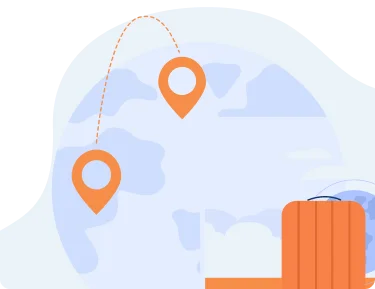5 important things to consider when shopping in France for Americans - FrenchEntrée

First published: October 25, 2022
Mandatory reading
Given the highest exchange rate of the US dollar to the euro in the last two decades, it's no surprise that more and more Americans are tempted by the dream of buying a vacation home or investing in real estate in France. While many American buyers successfully purchase property in France every year, there are some drawbacks and potential pitfalls that American citizens need to be aware of, so it's essential to do your homework before making a purchase. Before you start searching for your dream vacation home in France, here are five things you need to know.
1. You may not be able to obtain a French mortgage.
The mortgage market in France is contracting in light of recent events, with banks implementing stricter criteria for obtaining mortgages and gradually raising interest rates even for French residents. Although French mortgages are still available to foreign buyers and non-residents, our expert consultants from International Private Finance emphasize that American citizens living in the U.S. unfortunately face the strictest criteria for obtaining a mortgage, and more banks are refusing to lend to Americans. It is also worth noting that under French law, only French banks are authorized to issue mortgages on French property, so you will not be able to obtain a foreign mortgage. The situation is constantly changing, so it is highly recommended to seek up-to-date advice from an international mortgage consultant if you are relying on a French mortgage to finance your property purchase. Alternatively, it may be worth considering other options. The key point: right now, this is a market for buyers with cash, especially for American citizens.
2. Opening a French bank account may be more complicated than you think.
Although many French banks offer accounts for non-residents, FATCA (Foreign Account Tax Compliance Act) requirements mean that more and more banks in France are refusing to open accounts for American citizens. The FATCA legislation was added to the U.S. tax code in 2014 to prevent tax evasion by Americans living abroad or having foreign accounts, and essentially requires any international bank with accounts owned by American taxpayers to report to the U.S. tax authorities. In practice, this can be labor-intensive and costly (and have legal implications) for French banks, leading many to simply refuse to open accounts for Americans. The good news is that while this may make things simpler, especially for managing your second home in the long term, you actually do not need to have a bank account in France to purchase French real estate. A currency exchange specialist, such as Moneycorp, can make initial payments on your behalf, and you may have better luck opening an account once you have a registered address in France. Read our guide on opening an account in France for non-residents.
3. You will probably need a tax specialist.
The United States is one of the few countries that requires its citizens to file a tax return in the U.S., regardless of their residency status. This means that even if you decide to move to France, you will still have to file a tax return in the U.S., although there is a tax treaty between France and the United States to prevent double taxation. If you remain in the U.S.




4. You may need a visa
If you are buying a house in France, remember that you will be subject to the 90/180 day rule when visiting your property. If you dream of splitting your time between your American and French residences, you will need to carefully plan your time to take advantage of the visa-free travel regime. Alternatively, you will need to apply for a temporary long-term visa, which will allow you to stay in France for up to six months and come and go as many times as you need during that period. If you want to make additional trips outside of this six-month period, the good news is that the duration of the temporary long-term visa does not count towards the 90 days. However, it is important to keep in mind a significant limitation: if you do not plan to become a resident of France and, most importantly, be responsible for paying French taxes, you should not spend more than 183 days in France in any calendar year. Read our article to understand French tax - are you a tax resident of France?
5. You will probably need more documents than you think.
Anyone who has ever moved to France or bought property in France (including the French themselves!) will tell you the same thing - the French love their paperwork! When purchasing property in France, it's important to understand that you will need to provide quite an extensive dossier, including personal documents (such as a birth certificate, marriage certificate, and divorce certificate), proof of residence, and financial documents confirming income, loan debts, and savings - especially if you are applying for a French mortgage. Additionally, you will be presented with numerous documents from the notary on behalf of the seller when signing the sales agreement (Compromis de Vente) - the first sales contract you will sign when buying in France. It's important to remember that the Compromis de Vente is a legally binding document, and naturally, the contract and all accompanying documents will be in French! That's why it's so important to hire your own translator or legal advisor - before you sign the document.
If you want to buy property in France, our free webinar is a great opportunity to gain clarity on all the aforementioned topics and ask your questions directly to the experts. Join me on Tuesday, November 8, at 12:00 PM Eastern Time, and get the latest advice from our team of experts, including international French real estate agents from Agence Newton, tax specialists from Citrine International, and currency exchange experts from Moneycorp. We will answer all your questions about the French real estate market, foreign currency exchange, and taxes, with a particular focus on buyers from the United States.
Related articles
Author Zoë Smith, Digital Editor at FrenchEntrée, also works as a freelance journalist, having written for the Telegraph, HuffPost, and CNN, as well as updating the Rough Guide to France and the Rough Guide to Dordogne & Lot. She lives in the French countryside, not far from Nantes. Your email address will not be published. Required fields are marked *
Comments
We will find property in France for you
- 🔸 Reliable new buildings and ready-made apartments
- 🔸 Without commissions and intermediaries
- 🔸 Online display and remote transaction
Our managers will help you choose a property
Liliya
International Real Estate Consultant

Subscribe to the newsletter from Hatamatata.com!
Subscribe to the newsletter from Hatamatata.com!
Popular Posts
We will find property in France for you
- 🔸 Reliable new buildings and ready-made apartments
- 🔸 Without commissions and intermediaries
- 🔸 Online display and remote transaction
Our managers will help you choose a property
Liliya
International Real Estate Consultant

Subscribe to the newsletter from Hatamatata.com!
Subscribe to the newsletter from Hatamatata.com!
I agree to the processing of personal data and confidentiality rules of Hatamatata
Popular Offers


Need advice on your situation?
Get a free consultation on purchasing real estate overseas. We’ll discuss your goals, suggest the best strategies and countries, and explain how to complete the purchase step by step. You’ll get clear answers to all your questions about buying, investing, and relocating abroad.


Irina Nikolaeva
Sales Director, HataMatata



